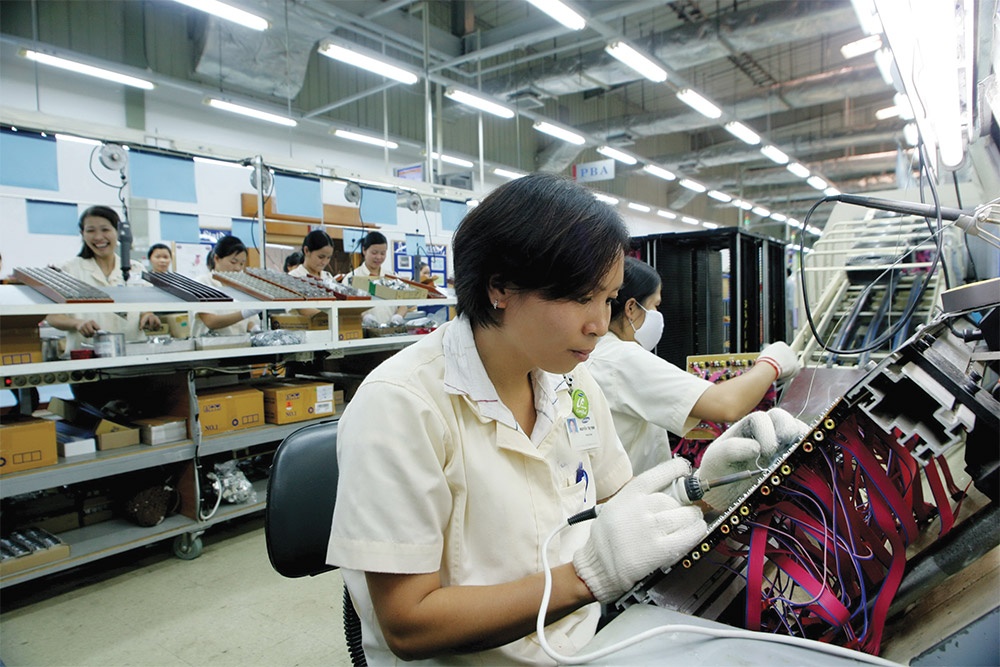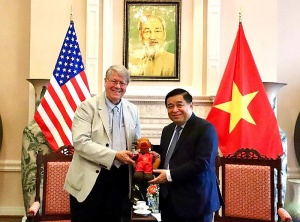Vietnam encouraged to capitalise on its high-tech industry progress
Bui Thi Viet Lam, representative of the US-ASEAN Business Council (USABC), shared at a seminar late last month that since Vietnam and the United States upgraded bilateral ties in September 2023, the business community has been enthusiastic and anticipated breakthrough policies, especially in high-tech and semiconductor industries.
“When these businesses meet with government leaders, they affirm that Vietnam is emerging as a prime destination, attracting US investors with the potential to become a regional high-tech hub,” Lam said.
 |
| Investment in semiconductors has been a prime focus in Vietnam for the past year, Photo: Le Toan |
However, she cautioned that this window of opportunity might only last for one or two years. Investment flows and investors have limitations, and Vietnam faces competition from other countries in the region.
“Over the past year, there has been a rapid shift in investment attraction towards Malaysia, Indonesia, and Singapore. Many investors initially explored Vietnam but eventually found reasons to invest in other markets,” she noted.
This competitive landscape poses a significant challenge for Vietnam.
“It’s unfortunate that these significant investments, when diverted to other countries, create entire ecosystems in those nations,” Lam elaborated. “Vietnam must act swiftly and strategically to capitalise on its current momentum and secure its place as a key player in the global supply chain.”
Dr. Nguyen Tu Anh, director general at the Department of General Economic Affairs under the Central Economic Commission, stated that Vietnam has significant opportunities to integrate deeper into the global supply chain, driven by government efforts to address economic bottlenecks, particularly infrastructure.
Specifically, new investment from China into Vietnam increased from approximately $2.3 billion in 2019 to $3.5 billion in 2023.
“Vietnam holds a unique position and a tremendous opportunity to connect with polarising trends and various economic poles,” Anh said. “Alongside the rising investment from China, capital inflows from other countries like the US, Japan, and South Korea have also continued to grow rapidly in recent times. From the perspective of Vietnam’s economy, there is no polarisation.”
Eric Broussard, vice president of Amazon, says Vietnam is increasingly positioning itself as a vital emerging manufacturing hub in Asia and globally. “Vietnam boasts a diverse range of manufacturing and supply capabilities, covering products from furniture and electronics to textiles and consumer goods,” Broussard said. “Amazon has a vast global customer base, and Vietnam has the potential to produce a wide array of high-quality, innovative, and competitive products.”
He also stressed the growing demand for environmentally friendly products, such as eco-friendly straws and recycled plastic bags, which are gaining significant attention in developed markets like the US and globally.
“These products from Vietnam are well-received for their quality and innovation, aligning with the increasing consumer preference for sustainability,” he added.
At the seminar, experts pointed out challenges including a shortage of skilled labour, high energy demand, and investment risks. Moreover, as global supply chains shift, there is a growing trend towards a green transformation.
“Vietnam must meet the global market’s carbon footprint reduction standards,” Anh said. “The country is gradually developing a carbon credit market and conducting greenhouse gas inventories for nearly 2,000 businesses. A significant opportunity is emerging for the economy and businesses from the global supply chain shift. The government is supporting enterprises, but businesses must anticipate risks and challenges to seize opportunities.”
Lam of the USABC agreed, stating that businesses cannot operate in isolation and face limitations compared to industry giants.
“For instance, few Vietnamese companies are part of Apple’s value chain,” she said. Therefore, she called for synchronised breakthrough policies, especially as neighbouring countries adopt bold strategies. Examples include sandbox trials to attract investment as Vietnam develops laws to encourage digital technology industries and a semiconductor development strategy.
Lam also urged Vietnamese companies to be proactive, prepare for transitions, and embrace trends like green credits and the digital economy to enhance competitiveness and boost exports. “Businesses must stay ahead of new trends to strengthen their competitive edge,” she said.
Meanwhile, Hoang Quang Phong, vice chairman of the Vietnam Chamber of Commerce and Industry (VCCI), highlighted that Vietnam is being chosen as a strategic and high-potential investment destination by many countries, corporations, and large enterprises globally.
“Vietnam has signed 16 free trade agreements with major global partners, many of which are currently in effect, creating substantial opportunities for supply chain development,” Phong noted. “However, according to a VCCI report, out of approximately 800,000 domestic private enterprises, less than 2 per cent are large enterprises. The business connectivity between domestic and foreign investors remains weak, and the spillover effect is not substantial.”
Dr. Le Duy Binh, managing director of Economica Vietnam, stressed, “To participate in the global supply chain, adopting environmental, social, and governance standards, as well as models of the circular and green economy, is no longer optional but a mandatory path for domestic enterprises.”
He acknowledged that joining international supply chains requires compliance not only with local regulations but also with international practices. “For example, businesses must adhere to the EU’s Carbon Border Adjustment Mechanism and the EU’s Anti-Deforestation Regulation,” Binh added.
 | Vietnam poised for semiconductor boom Vietnam has significant opportunities to develop its semiconductor and AI industries, leveraging a young and well-trained workforce, according to Dr Richard Lawton Thurston, former vice chairman of TSMC. |
| PM visits Samsung’s semiconductor cluster in RoK’s Gyeonggi province Prime Minister Pham Minh Chinh and his entourage on July 3 visited Samsung's semiconductor cluster in Gyeonggi province as part of his official visit to the Republic of Korea (RoK). |
| Inflows picking up the pace for semiconductors Semiconductors are heating up foreign investment inflows into Vietnam, and capturing a larger proportion of the total. |
What the stars mean:
★ Poor ★ ★ Promising ★★★ Good ★★★★ Very good ★★★★★ Exceptional
Related Contents
Latest News
More News
- SK Innovation-led consortium wins $2.3 billion LNG project in Nghe An (February 25, 2026 | 07:56)
- THACO opens $70 million manufacturing complex in Danang (February 25, 2026 | 07:54)
- Phu Quoc International Airport expansion approved to meet rising demand (February 24, 2026 | 10:00)
- Bac Giang International Logistics Centre faces land clearance barrier (February 24, 2026 | 08:00)
- Bright prospects abound in European investment (February 19, 2026 | 20:27)
- Internal strengths attest to commitment to progress (February 19, 2026 | 20:13)
- Vietnam, New Zealand seek level-up in ties (February 19, 2026 | 18:06)
- Untapped potential in relations with Indonesia (February 19, 2026 | 17:56)
- German strengths match Vietnamese aspirations (February 19, 2026 | 17:40)
- Kim Long Motor and AOJ Suzhou enter strategic partnership (February 16, 2026 | 13:27)

 Tag:
Tag:




















 Mobile Version
Mobile Version